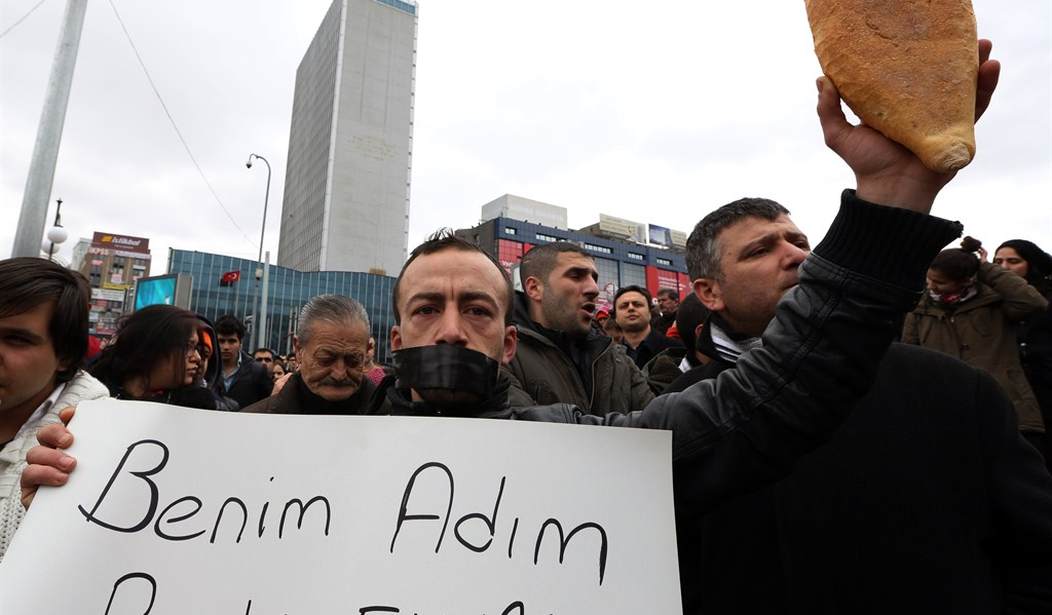In many respects, Turkey today is an exemplar of the Middle East as a whole -- a nation divided by geography, religious loyalties and politics.
It is moderate in many ways, going back to the secular program of Ataturk; yet as Prime Minister Tayyip Erdogan’s recent program for Islamization would suggest, it is also extreme.
It wants to reside in the 21st century, but continually looks into the rear-view mirror at the former Ottoman Empire. It is pro-West and anti-West, once supportive of the United States but now at odds. It was an economic miracle, the darling of Wall Street for a decade, but is riddled with debt. At any given moment, almost anything one says about Turkey could be true.
President Obama was once fond of calling Erdogan his closest ally on the foreign stage, but the friendship has not stood the test of time. Although still a member of NATO and geographically a bridge between Europe and Asia, the current Turkish leadership is tilting away from the United States.
The unwillingness of the United States to assist the rebels in Syria was a disappointment to Erdogan, but even more crucial in undermining the relationship has been the Obama administration’s recent rapprochement with Iran.
U.S. negotiations with Iran over the enrichment of uranium have led to the justifiable fear that the United States will countenance an Iranian bomb. The belief gaining traction throughout the region is that a Shia Crescent, the imperial Persian dream, may ultimately be realized with complicit American action.
So profound is this sentiment that tectonic alternations are underway in Turkey and throughout the Middle East.
Saudi Arabia has made it clear that it does not want a seat in the U.N. Security Council as long as negotiations with Iran continue. Saudi Prince Bandar, a longstanding ally of the United States, has turned against American foreign policy with outspoken vengeance. He has even suggested the U.S. nuclear umbrella is unreliable and has prompted discussion with Pakistan over the acquisition of nuclear weapons should Iran be given a green light for further enrichment of uranium.
Recommended
It is not coincidental that Turkish foreign policy positions follow a Saudi script, since capital from Riyadh underwrites much of the faltering Turkish economy. Should Saudi Arabia obtain nuclear weapons, Turkey will be waiting its turn with open arms.
Egypt too, once firmly registered in alliance with the U.S., is now turning to Saudi Arabia for aid and may even look to Russia for military assistance if the U.S. continues to withhold the Apache aircraft it promised in the past.
Emerging from this chaotic Middle East equation is a Sunni alliance composed of Turkey, with the region’s largest army and most formidable air force; Saudi Arabia, the richest of the Gulf states; and Egypt, the most populous Arab nation and located in a critical geographic location.
Whether this Sunni alliance can hold is another matter. Erdogan supported the now-deposed Muslim Brotherhood’s ascension in Egypt and criticized the new Egyptian government’s vow to reinforce its peace treaty with Israel -- a pact that the Muslim Brotherhood’s Mohamed Morsi had pledged to abrogate.
Turkey has a history of deposing popularly elected governments with military coups, and while Erdogan has done his best to purge the Turkish military of prospective adversaries, a repeat of that scenario cannot be ruled out, especially in light of the ticking Turkish debt bomb. In any event, recent polls indicate he has lost support across the country.
As for Saudi Arabia, its ascension to a leadership position in what we refer to in our new book as the “Sunni vanguard” owes itself to the Saudis’ ability to pay the bills for both Egypt and Turkey, but that largesse might be jeopardized if fracking and other U.S.-based energy technologies replace the global reliance on Middle East oil.
Notwithstanding the fragility of this alliance, the impending Iranian threat unites Sunni brethren. Erdogan is not a beloved figure in this shaky coalition. He has one foot in the camp of moderates, the other in the miasma of terrorists; and he is known to be unreliable. He is also in a precarious electoral position at home.
For Turkey, a corruption scandal, a dramatic increase in interest rates that has forestalled a precipitous decline in the lira, demonstrations on the streets of Istanbul and Ankara and the end of the Turkish economic miracle that gave Erdogan a free ride from 2002 to 2008, have all contributed to an unpredictable and dangerous period ahead.

























Join the conversation as a VIP Member